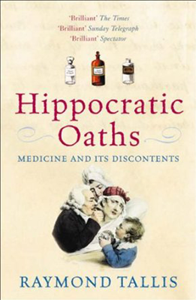




Medical Curriculum Vitae Summary
Prior to his retirement from medicine to become a full-time writer, Raymond Tallis was a Professor of Geriatric Medicine in the University of Manchester. He has clinical, research, teaching an and administrative responsibilities. As a consultant in Geriatric Medicine he had responsibility for acute and rehabilitation patients and took part in the on call rota for acute medical emergencies. He also ran a unique specialist epilepsy service for older people. Amongst his 200 or so medical publications are two major textbooks. Most of his research publications are in the field of neurology of old age and neurological rehabilitation, and in 2000 he was elected Fellow of the Academy of Medical Sciences in recognition of his contribution to medical research in these areas. His national roles have included: Consultant Advisor in Health Care of the Elderly to the Chief Medical Officer; a key part in developing National Service Framework for Older People, in particular the guidelines of care of stroke patients which became policy; membership of the National Institute for Clinical Excellence Appraisal Committee; Chairmanship of the Royal College of Physicians Committee on Ethics in Medicine; Chairman of the committee reviewing ethics support for front-line clinicians; and membership of the Working Party producing the seminal report Doctors in Society, Medical Professionalism in a Changing World (2005).
Clinical Responsibilities
Professor Raymond Tallis trained as a doctor at the University of Oxford and St. Thomas's hospital. From 1987 to 2006 he was Professor of Geriatric Medicine at the University of Manchester and a consultant physician in Health Care of the Elderly in Salford. He had responsibility for acute and rehabilitation in-patients and ran a unique specialist epilepsy service for older people.
Unlike many senior academic medics, he was involved in admission of acute patients and participated in the on-call rota.
Service Developments
Raymond Tallis has contributed to many improvements in the provision of health care for elderly people in Salford and beyond, in particular the development of stroke services and services for elderly people with epilepsy. He was a Non-Executive Director on the Board of Salford Royal Hospitals Trust from 1994-1999, involved in strategic planning for the Trust at a time of very rapid change both within the Trust and, more widely, in the health service.
Between May 1997 and June 2001 Raymond Tallis was Project Director for Neurosciences, overseeing the development of a single Neurosciences Centre and an Integrated Neurosciences service for the 3m population of Greater Manchester. The £8m Humphrey Booth Building, which includes a unique Clinical Research Centre for Neurosciences and Ageing, for which he raised the funding, opened on time in June 2001. During his period as Project Director, he instigated a radical review of neurology, neurosurgical, neurorehabilitation and other clinical neuroscience services, which recommended novel ways of working and of delivering services that anticipated many of the ideas in the subsequent NHS Plan. The service is now recognised as one of the national leaders and has pioneered many models of care delivery that have been adopted elsewhere.
Approximately 200-300 senior clinicians and managers were involved in the process of developing the service. At the same time Tallis worked with colleagues to foster cooperation with other neuroscience centres in the North West with a view to developing a single 'virtual' centre. The aim was to set uniform high standards of (evidence-based) care and to avoid the wasteful duplication of highly specialised services that had been encouraged by the inanities of the so-called 'internal market' in the NHS. This also permitted the further development of specialist (so-called ‘tertiary’) services and very high quality sub-specialist services for relatively rare conditions.
Role in Education and Training
In addition to extensive 'routine' undergraduate and postgraduate medical teaching and examining responsibilities, Raymond Tallis contributed to advancing multi-disciplinary education, in part through the Humphrey Booth Education Centre, which he established in 1988 and has directed since then. He reformed the North West training programme for specialist registrars in geriatric medicine. He was Dean for Admissions for the medical school between 1991 and 2001. During that time he had a central role in:
-
introducing universal interviews for all suitable applicants;
-
in reviewing the entire admissions process — in cooperation with the Committee on Racial Equality and in response to a report on medical schools admission procedures — commissioned by the Committee on Heads of Medical Schools;
-
and, in the mid-90s in developing a mentoring scheme for potential medical students from disadvantaged backgrounds as part of an overall strategy of widening access.
National Responsibilities
Raymond Tallis has had many national roles. From 1996 to 2000, he was Consultant Adviser in Care of the Elderly to the Chief Medical Officer. In 1999-2000, he was Vice-Chairman of the Stroke Task Force of the Advisory Group developing the National Service Framework for Older People. He has been on the Standing Medical Advisory Committee and the Council of the Royal College of Physicians and was secretary of the Joint Specialist Committee of the Royal College on Health Care of the Elderly between 1995 and 2003. He was a member of the Joint Task Force on Partnership in Medicine Taking, established by the Secretary of State for Health in 2001. For three years he was a member of one of the appraisal panels of the National Institute of Clinical Excellence.
Research
In the early 90s Professor Tallis led gerontology in Manchester to national leadership, reflected in its rating as a 'flagged subject' in the 1996 Research Assessment Exercise. Subsequently he established the Stroke Association's Therapy Research Unit at Hope hospital (opened in 1996) and, in collaboration with others, raised nearly £4m in research grants and research support funds. This includes £1.5m from the Humphrey Booth Charities to develop a Clinical Research Centre for Neurosciences and Ageing with the new neurosciences building.
His research was predominantly in three areas:
-
developing objective measures of outcome in neurological rehabilitation;
-
evaluating conventional and novel approaches to neurological rehabilitation;
-
epilepsy in older people.
Amongst his 200 or so medical publications (listed on a separate page) are two major textbooks - The Clinical Neurology of Old Age (Wiley, 1988) and Brocklehurst's Textbook of Geriatric Medicine and Gerontology
(Wiley, 1988) and Brocklehurst's Textbook of Geriatric Medicine and Gerontology (co-edited with Howard Fillett, up to the 6th edition). His Epilepsy in Elderly People
(co-edited with Howard Fillett, up to the 6th edition). His Epilepsy in Elderly People (Dunitz) was published in 1996, and he edited Increasing Longevity: Medical, Social and Political Implications
(Dunitz) was published in 1996, and he edited Increasing Longevity: Medical, Social and Political Implications (RCP Publications) in 1998. Most of his research articles are in the field of neurology of old age and neurological rehabilitation. Original articles have been published in leading medical journals, including Lancet and Nature Medicine. He was editor-in-chief of Reviews in Clinical Gerontology (Cambridge University Press) from 1988-1998. He refereed papers for journals such as the Lancet and grant applications for bodies such as MRC, Wellcome, and Research into Ageing.
(RCP Publications) in 1998. Most of his research articles are in the field of neurology of old age and neurological rehabilitation. Original articles have been published in leading medical journals, including Lancet and Nature Medicine. He was editor-in-chief of Reviews in Clinical Gerontology (Cambridge University Press) from 1988-1998. He refereed papers for journals such as the Lancet and grant applications for bodies such as MRC, Wellcome, and Research into Ageing.
Raymond Tallis has supported academic medicine nationally through his membership of the AMRC Committee on Public Understanding of Science in Medicine and his role as secretary of the 1942 club as well as much work for the Academy of Medical Sciences. With Professor Richard Frackowiack he wrote a major report Restoring Neurological Function: Putting the Neurosciences to Work in Neurological Rehabilitation (2004) on behalf of the Academy.
In 2000 Professor Tallis was elected Fellow of the Academy of Medical Sciences in recognition of his contribution to medical research.
Education, degrees and qualifications
1954-1964: Liverpool College
1964: Open Scholarship (Medicine), Keble College, Oxford University
1967: BA, Animal Physiology, Oxford University
1970: BM, BCh, Oxford University and St Thomas' Hospital, London
1976: MRCP (UK), London (FRCP, 1988)
1997: Doctor of Letters, Honoris causa, University of Hull
2000: Fellow of the Academy of Medical Sciences
2002: Doctor of Letters, Honoris causa, University of Manchester
2008: Fellow of the Royal Society of Arts
2009: Judge for the £25,000 Wellcome Book Prize
2009: Steering Committee Member, University College London Crucible Centre
2010: Patron of Dignity in Dying
2008: Fellow of the Royal Society of Arts
2009: Judge for the £25,000 Wellcome Book Prize
2009: Steering Committee Member, University College London Crucible Centre
2010: Patron of Dignity in Dying
2015: Doctor of Science, Honoris causa, University of London, July 2015






